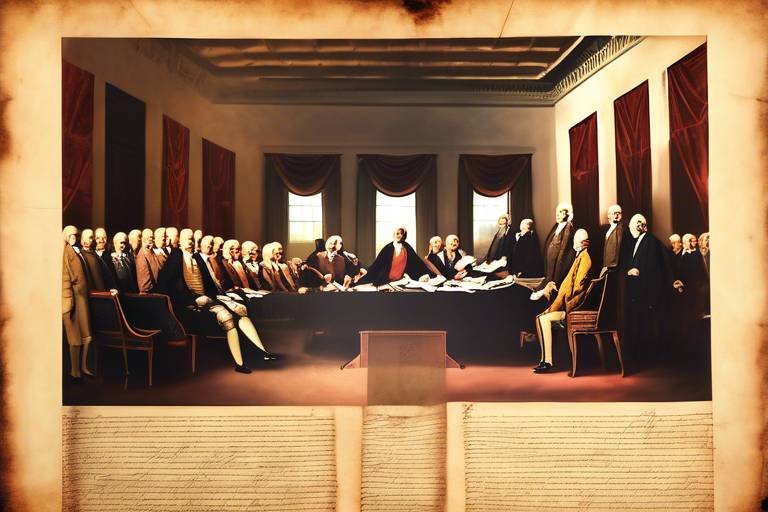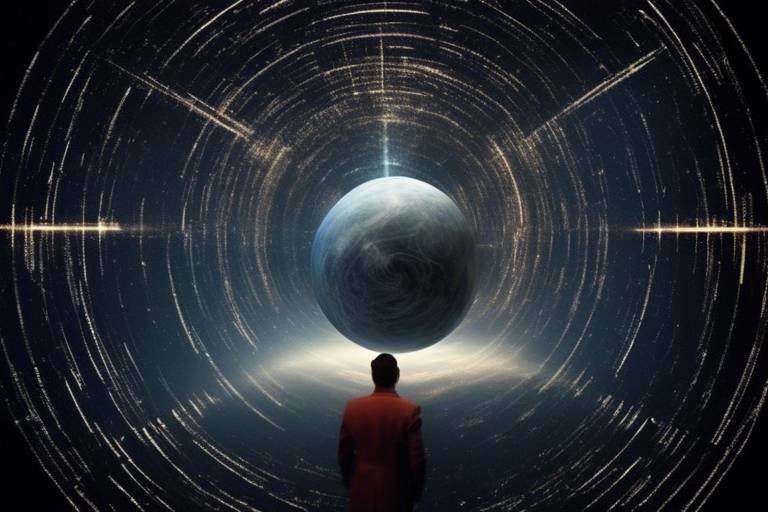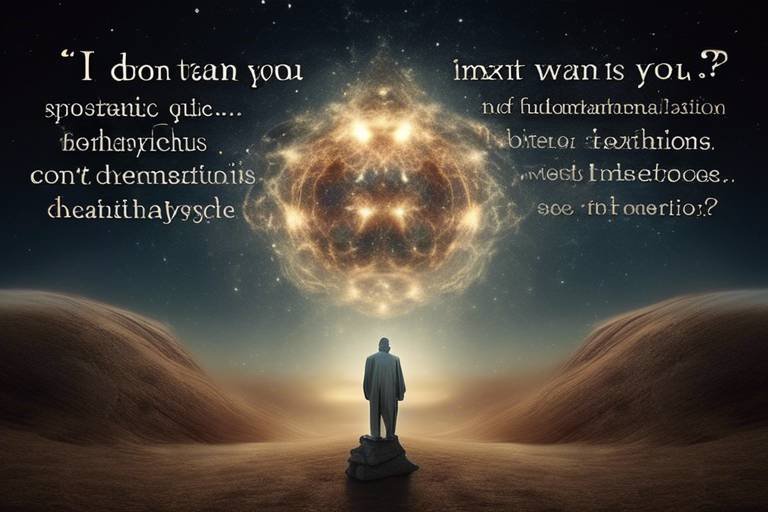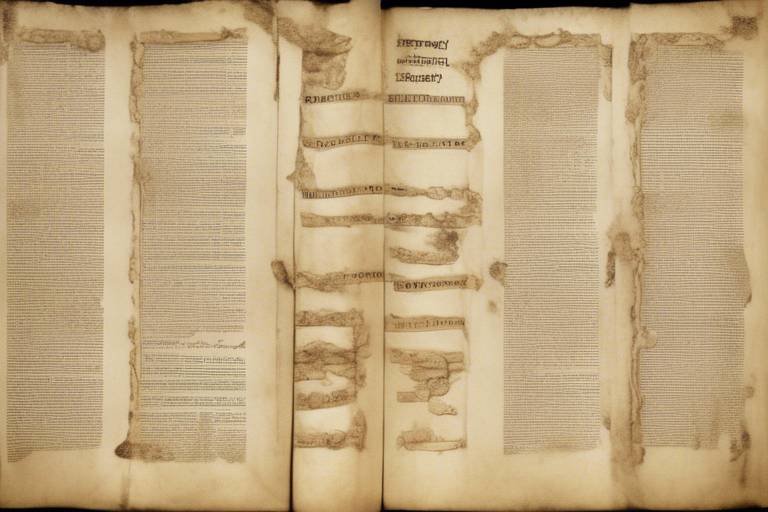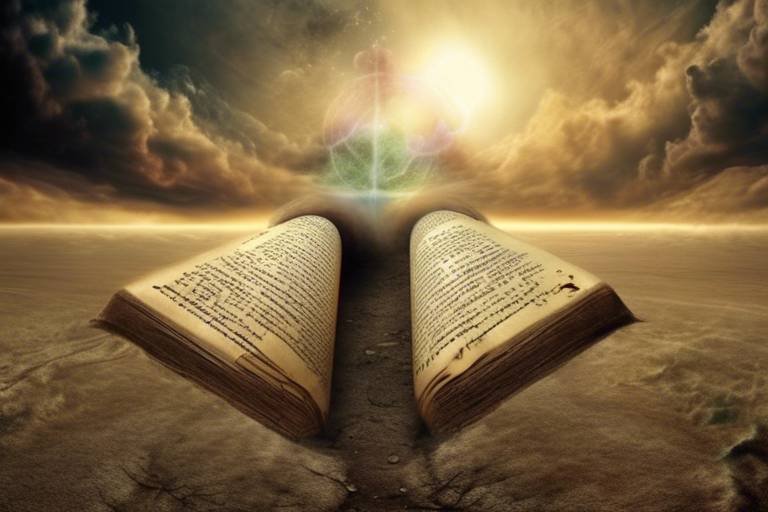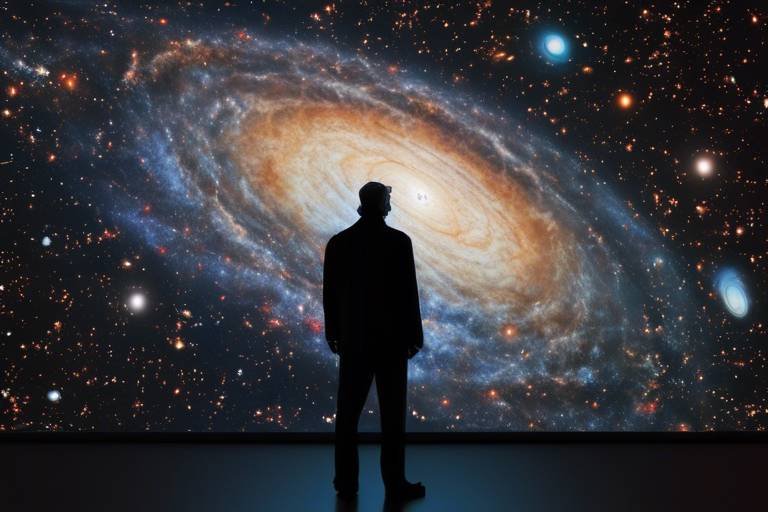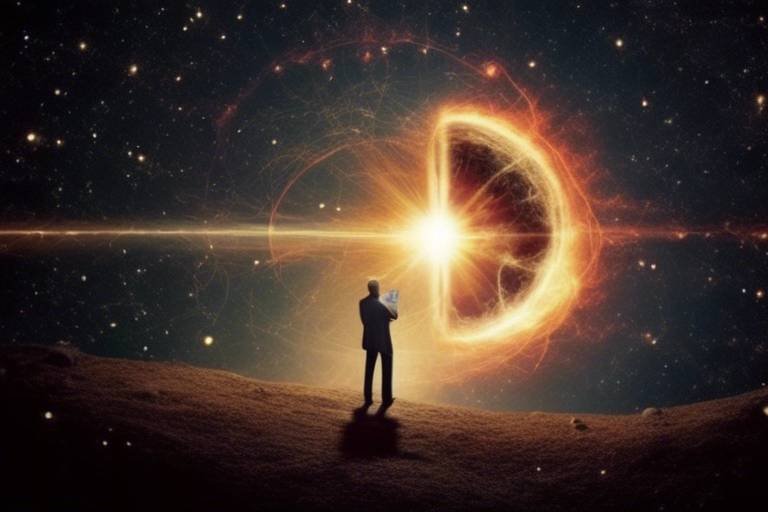The Metaphysical Interpretation of Quantum Mechanics
Have you ever wondered what lies beyond the veil of our everyday reality? The realm of quantum mechanics invites us to explore a universe that dances to a tune far removed from the classical physics that governs our daily lives. It’s not just a collection of scientific principles; it’s a doorway into a metaphysical landscape that challenges our deepest beliefs about existence, consciousness, and the very fabric of reality itself. In this article, we will embark on a thought-provoking journey through the philosophical implications of quantum mechanics, examining how it reshapes our understanding of what it means to be alive in this vast cosmos.
At first glance, quantum mechanics might seem like a complex mathematical framework, but peel back the layers, and you'll find it teeming with profound insights. Imagine a world where particles can exist in multiple states simultaneously, where the observer plays an active role in shaping outcomes. This is the strange yet fascinating domain of wave-particle duality, a concept that suggests reality is not as fixed as it appears. It’s as if the universe is a stage, and we are all players in a grand performance, with our perceptions and observations influencing the script.
As we delve deeper, we encounter the intricate relationship between consciousness and observation. Could it be that our very awareness is intertwined with the fabric of reality? Some theories propose that consciousness is not merely a byproduct of physical processes but a fundamental aspect of the universe itself. This idea raises tantalizing questions: Are we merely passive observers, or do we actively participate in the creation of our reality? The implications are staggering, suggesting that our thoughts and intentions might ripple through the quantum field, shaping the world around us.
But what does it mean to measure something in this quantum realm? The act of measurement is not just a mechanical process; it’s a philosophical conundrum that challenges our understanding of determinism and free will. When we measure a quantum system, we collapse its wave function, selecting a specific outcome from a multitude of possibilities. This act of choosing raises profound questions about knowledge itself: Is our understanding of reality merely an illusion shaped by our perceptions, or is there an objective truth waiting to be uncovered?
As we navigate through the various interpretations of quantum mechanics, we encounter a rich tapestry of ideas that reflect our attempts to grapple with these mysteries. From the Copenhagen interpretation, which emphasizes the role of the observer, to the Many-Worlds Interpretation, which posits the existence of parallel universes, each theory offers a unique lens through which to view the quantum world. These interpretations not only challenge our scientific understanding but also invite us to reconsider our metaphysical beliefs about existence and interconnectedness.
In the realm of quantum mechanics, the concept of entanglement emerges as a particularly intriguing phenomenon. Imagine two particles that remain connected, regardless of the distance separating them. This nonlocality challenges our conventional understanding of separateness and individuality, suggesting that we are all part of a vast, interconnected web of existence. The implications of this interconnectedness extend beyond the physical realm and may even influence our collective human experience and consciousness.
As we conclude this exploration into the metaphysical interpretation of quantum mechanics, it becomes evident that this field of study is not merely an academic pursuit; it’s a profound inquiry into the nature of reality itself. The questions it raises about consciousness, observation, and interconnectedness resonate deeply with our human experience, inviting us to reflect on our place in the universe. So, the next time you gaze at the stars or ponder the mysteries of existence, remember that you are part of a grand cosmic dance, where every thought, every observation, and every moment shapes the reality we inhabit.
- What is quantum mechanics? Quantum mechanics is a fundamental theory in physics that describes the physical properties of nature at the scale of atoms and subatomic particles.
- How does quantum mechanics challenge traditional views of reality? It introduces concepts like wave-particle duality and the observer effect, suggesting that reality is not fixed and can be influenced by observation.
- What is the observer effect? The observer effect refers to changes that the act of observation can make on a quantum system, highlighting the role of consciousness in measurement.
- What are some interpretations of quantum mechanics? Key interpretations include the Copenhagen interpretation, Many-Worlds Interpretation, and pilot-wave theory, each offering different insights into the nature of reality.
- How does quantum entanglement relate to consciousness? Quantum entanglement suggests a deep interconnectedness that may extend beyond the physical realm, potentially influencing collective human experience and awareness.

The Nature of Reality
The realm of quantum mechanics is like stepping into a surreal painting where traditional rules of physics no longer apply. Imagine a world where particles can exist in multiple states at once, a phenomenon known as wave-particle duality. This duality challenges our conventional understanding of reality, forcing us to rethink what we perceive as the "real" world. In classical physics, objects have a definite position and momentum, but quantum mechanics introduces a level of uncertainty that can be both thrilling and bewildering.
One of the most fascinating aspects of quantum mechanics is the role of the observer. Have you ever pondered how your mere act of looking at something might influence its behavior? This is where the concept of the observer effect comes into play. It suggests that the act of observation can alter the state of a quantum system. For example, when we attempt to measure a particle's position, we inadvertently change its momentum. This raises profound questions: Is reality a fixed entity, or is it a fluid construct shaped by our perceptions? Are we mere spectators in a cosmic play, or do we actively participate in the unfolding of reality?
To further illustrate this, let’s consider a simple analogy. Think of reality as a movie being projected on a screen. In classical physics, the film runs continuously, and the scenes are predetermined. However, in the quantum realm, the film can change based on who is watching it. The observer, in this case, has the power to influence the narrative. This idea can be both empowering and daunting, as it suggests that our consciousness may hold a significant role in shaping the universe around us.
As we dive deeper into the implications of quantum mechanics, we encounter questions that challenge our very existence. If reality is not an objective truth but rather a subjective experience, what does that mean for our understanding of knowledge, existence, and the universe? The implications stretch beyond science and into the realms of philosophy and spirituality, inviting us to explore the interconnectedness of all things.
In summary, quantum mechanics invites us to reconsider our understanding of reality. It challenges us to embrace uncertainty and recognize the profound impact of observation. As we navigate this enigmatic landscape, we must remain open to the possibility that reality is not a static entity, but rather a dynamic interplay of consciousness and existence. The nature of reality, as proposed by quantum mechanics, is a complex tapestry woven from the threads of observation, perception, and interconnectedness.
- What is wave-particle duality? Wave-particle duality is the concept that particles, like electrons and photons, exhibit both wave-like and particle-like properties, depending on how they are observed.
- How does the observer effect influence quantum mechanics? The observer effect suggests that the act of measuring or observing a quantum system can change its state, which raises questions about the nature of reality.
- Are consciousness and reality interconnected? Some theories propose that consciousness plays a fundamental role in shaping reality, suggesting a deep connection between the observer and the observed.
- What are the philosophical implications of quantum mechanics? Quantum mechanics challenges traditional notions of determinism and free will, prompting discussions about the nature of knowledge and existence itself.

When we dive into the fascinating world of quantum mechanics, one of the most intriguing aspects is the relationship between consciousness and observation. It’s almost as if we’ve stumbled upon a cosmic secret that challenges everything we thought we knew about reality. Imagine for a moment that the universe is like a grand stage play, where the act of observing is akin to shining a spotlight on the performers. In this metaphor, what happens when the spotlight is turned off? Are the performers still there, or do they fade into the shadows of possibility? This is the essence of how consciousness interacts with quantum phenomena.
At the heart of this discussion lies the concept of the observer effect, which posits that the act of observation can fundamentally alter the state of a quantum system. This phenomenon raises profound questions: If our mere observation can change the outcome of a quantum event, what does that say about the nature of reality itself? Is reality something that exists independent of our perception, or is it a fluid construct that shifts and morphs based on our awareness? These are not just theoretical musings; they challenge the very foundation of how we understand existence.
To better understand the observer effect, let's consider a simple analogy. Picture a coin spinning in the air. While it’s spinning, it’s neither heads nor tails; it exists in a state of superposition. However, the moment we catch it and look at it, we force it into one of those two states. In quantum mechanics, this act of observation collapses the wave function, determining the state of the particle. This leads us to ponder: is our consciousness the catalyst that causes this collapse? Are we, in some way, co-creators of reality?
Furthermore, the implications of this relationship extend beyond mere curiosity. They touch on the very essence of free will and determinism. If consciousness can influence the outcome of quantum measurements, does this imply that we have a say in the fabric of reality? Or are we merely observers in a predetermined universe? These questions are at the forefront of philosophical debates, leading us to explore the nature of knowledge itself.
Measurement in quantum mechanics is not just a technical process; it carries significant philosophical weight. When we measure a quantum system, we are not merely recording data; we are engaging in an act that shapes reality. This brings forth a myriad of debates around determinism versus free will. If our consciousness plays a role in measurement, then perhaps we are not as constrained by the laws of physics as we once thought. The implications of this can be both liberating and daunting.
Different interpretations of quantum mechanics offer varying perspectives on the role of the observer. The Copenhagen interpretation suggests that the observer is essential in determining the state of a quantum system, while the Many-Worlds Interpretation posits that all possible outcomes occur, each in its own branching universe. This divergence in thought illustrates that our understanding of observation is still evolving. Some recent theories even propose that consciousness itself is a fundamental aspect of the universe, intertwining with the fabric of reality in ways we are only beginning to understand.
In conclusion, the relationship between consciousness and observation in quantum mechanics is a profound area of exploration that not only challenges our understanding of reality but also invites us to reconsider our place within it. As we continue to delve deeper into these mysteries, we may find that the very act of observing is a gateway to new realms of understanding, where consciousness and reality are not separate but intricately linked.
- What is the observer effect in quantum mechanics? The observer effect refers to the phenomenon where the act of observation alters the state of a quantum system.
- Does consciousness play a role in quantum mechanics? Some theories suggest that consciousness may influence quantum events, raising questions about the nature of reality.
- What are the implications of quantum mechanics on free will? The relationship between consciousness and quantum mechanics challenges traditional notions of determinism and free will.
- How do different interpretations of quantum mechanics view the observer's role? Interpretations like the Copenhagen interpretation emphasize the observer's role, while others like the Many-Worlds Interpretation suggest multiple outcomes exist simultaneously.

The Observer Effect
The Observer Effect is one of the most fascinating and perplexing aspects of quantum mechanics. It suggests that the very act of observation can alter the state of a quantum system. Imagine you’re peeking into a secret garden; the moment you step in, the flowers seem to change their colors as if they were waiting for you. In quantum physics, this metaphorical garden is a world where particles exist in a state of probability until they are observed. This phenomenon raises profound questions about the nature of reality itself. Are we merely passive observers, or do we actively shape the universe around us?
To understand this concept better, let’s break it down. The Observer Effect implies that when a measurement is made, it forces a quantum system to 'choose' a state from its potential outcomes. This is starkly different from classical physics, where observation does not influence the state of an object. A classic example can be drawn from the famous double-slit experiment, where light behaves as both a wave and a particle. When not observed, it creates an interference pattern, suggesting it travels through both slits simultaneously. However, the moment we observe it, it behaves like a particle, choosing one slit to pass through. This dramatic shift begs the question: what is the role of the observer in this cosmic play?
Consider the implications of this effect in our daily lives. If our consciousness can influence the behavior of particles, could it also affect larger systems? For instance, think about how our thoughts and intentions can shape our experiences. This idea resonates with various philosophical and spiritual beliefs that emphasize the power of consciousness in shaping reality. What if our collective awareness could influence not just quantum states but also societal outcomes? This line of thinking opens a Pandora's box of possibilities, where the boundaries between the observer and the observed blur.
Moreover, the Observer Effect challenges our understanding of knowledge itself. It raises questions about determinism and free will. If observation changes the outcome, are we truly in control of our choices, or are we merely responding to the universe’s whims? This philosophical conundrum can be illustrated in a table that summarizes key interpretations of the Observer Effect:
| Interpretation | Key Idea |
|---|---|
| Copenhagen Interpretation | Observation collapses a wave function into a definite state. |
| Many-Worlds Interpretation | All possible outcomes occur in separate, branching universes. |
| Pilot-Wave Theory | Particles have definite positions and velocities, guided by a wave function. |
In essence, the Observer Effect invites us to reconsider our place in the universe. It suggests that we are not mere spectators but active participants in the cosmic drama. The implications stretch beyond physics into the realms of philosophy and consciousness studies, challenging us to explore how our perceptions shape reality. So, next time you ponder the mysteries of existence, remember that your very act of observation might just be weaving the fabric of the universe itself.

The act of measurement in quantum mechanics is not just a technical procedure; it opens a Pandora's box of philosophical questions that challenge our understanding of reality itself. At the heart of this inquiry lies the question: what does it mean to measure something? In classical physics, measurement is straightforward. You take a ruler, a scale, or a thermometer, and the results are clear-cut. However, in the quantum realm, measurement becomes a profound act that can alter the very state of what is being measured.
One of the most perplexing implications of measurement is the debate between determinism and free will. If quantum mechanics suggests that outcomes are probabilistic rather than predetermined, does that mean our choices are also influenced by randomness? For instance, when you flip a coin, the outcome is uncertain until you observe it. This uncertainty raises questions about the predictability of events in our lives and whether we truly have control over our decisions.
Furthermore, the nature of knowledge itself is called into question. In the quantum world, the act of observing can fundamentally change the state of a system. This leads to the philosophical dilemma of whether we can ever truly know something without influencing it. As physicist Niels Bohr famously stated, “There is no quantum world. There is only an abstract quantum description.” This suggests that our understanding of reality is inherently limited by our methods of observation.
To illustrate the complexities surrounding measurement, consider the following table that summarizes key philosophical implications:
| Philosophical Question | Implication |
|---|---|
| Is reality deterministic or probabilistic? | Challenges our understanding of causality and predictability. |
| What is the role of the observer? | Questions whether knowledge is objective or subjective. |
| Can we know something without influencing it? | Raises doubts about the nature of knowledge and reality. |
Moreover, the philosophical implications of measurement extend into the realm of ethics and responsibility. If our actions are influenced by quantum randomness, how do we hold individuals accountable for their decisions? This conundrum could reshape legal and moral frameworks, making us reconsider the very foundations of justice and personal responsibility.
In conclusion, the philosophical implications of measurement in quantum mechanics are vast and multifaceted. They compel us to rethink our assumptions about reality, knowledge, and free will. As we delve deeper into these questions, we may find that the answers are as elusive and enigmatic as the quantum phenomena themselves.
- What is the observer effect in quantum mechanics?
The observer effect refers to changes that the act of observation can make on a quantum system. - How does quantum mechanics challenge classical physics?
Quantum mechanics introduces concepts like superposition and entanglement, which contradict classical intuitions about separateness and determinism. - What are the implications of quantum entanglement for consciousness?
Some theories suggest that quantum entanglement may imply a deeper interconnectedness that could influence collective human consciousness and awareness.

The role of the observer in quantum mechanics is nothing short of fascinating and has sparked a myriad of debates among physicists and philosophers alike. At the heart of this discussion is the idea that the act of observation can fundamentally alter the state of a quantum system. Imagine a world where your mere gaze could change the outcome of events—this is the essence of quantum mechanics. When we talk about the observer, we're not just referring to a passive bystander; rather, we're considering an active participant in the unfolding of reality.
One of the most well-known interpretations of this phenomenon is the Copenhagen interpretation, which posits that particles exist in a state of probability until they are observed. This means that until we take a measurement, a particle can be in multiple states simultaneously—a concept that can be quite mind-bending! To illustrate this, consider Schrödinger's cat, a thought experiment wherein a cat in a box is simultaneously alive and dead until someone opens the box to observe it. This paradox highlights the profound implications of observation in quantum mechanics.
However, the Copenhagen interpretation is just one of many. Other interpretations, such as the Many-Worlds Interpretation and pilot-wave theory, offer alternative views on the observer's role. In the Many-Worlds Interpretation, every possible outcome of a quantum event actually occurs, but in separate, branching universes. Here, the observer doesn't collapse the wave function; instead, they become part of a vast multiverse where all possibilities coexist. On the other hand, pilot-wave theory suggests that particles have definite positions at all times, guided by a "pilot wave," which adds another layer to the observer's influence.
What does this mean for our understanding of reality? Well, it raises profound questions about determinism and free will. If our observations can influence outcomes, are we merely observers in a predetermined universe, or do we have a hand in shaping our reality? This interplay between observer and observed challenges the traditional boundaries of knowledge and existence, making us rethink the very fabric of our universe.
In conclusion, the role of the observer in quantum mechanics is not just a scientific inquiry; it is a philosophical exploration that invites us to reconsider our relationship with reality. As we delve deeper into these quantum mysteries, we may find that the act of observation is not just about seeing, but about participating in the creation of reality itself. The implications are staggering, leading us to ponder: if consciousness can influence reality, what does that say about the power we hold as individuals?
- What is the observer effect in quantum mechanics?
The observer effect refers to changes that the act of observation can make on a quantum system. It suggests that measuring a system can alter its state.
- How does the Copenhagen interpretation explain the role of the observer?
The Copenhagen interpretation posits that particles exist in a state of probability until they are observed, at which point their state becomes definite.
- What are some other interpretations of quantum mechanics?
- Many-Worlds Interpretation
- Pilot-Wave Theory
- Objective Collapse Theories
- Can consciousness influence reality?
This is a debated topic, with some theories suggesting that consciousness may play a fundamental role in the act of measurement, thereby influencing reality.

Quantum mechanics is a realm where the ordinary laws of physics seem to bend and twist, leading to a multitude of interpretations that challenge our very understanding of reality. Imagine standing at the edge of a vast ocean, where each wave represents a different theory, crashing into the shores of philosophical inquiry. Each interpretation offers a unique lens through which to view the bizarre behavior of particles at the quantum level, and they often evoke more questions than answers. Let’s dive into some of the most prominent interpretations that have emerged over the years.
One of the most famous interpretations is the Copenhagen Interpretation, proposed by Niels Bohr and Werner Heisenberg in the early 20th century. This interpretation posits that quantum particles exist in a state of probability until they are observed. In essence, the act of measurement collapses the wave function, determining the particle's state. This leads us to ponder: if reality is contingent upon observation, what does that say about the nature of existence itself? Are we mere spectators in a cosmic play, or do we hold the power to shape reality with our consciousness?
In stark contrast, we have the Many-Worlds Interpretation, championed by Hugh Everett III. This theory suggests that every possible outcome of a quantum event actually occurs, but in separate, branching universes. Picture a vast tree, where each branch represents a different reality. This interpretation not only expands our understanding of quantum phenomena but also raises profound questions about fate and free will. If every choice spawns a new universe, are we truly in control of our destinies, or are we simply following a predetermined path in one of countless realities?
Another intriguing perspective is the Pilot-Wave Theory, introduced by Louis de Broglie and later developed by David Bohm. This interpretation suggests that particles have definite positions and velocities, guided by a 'pilot wave.' It offers a deterministic view of quantum mechanics, standing in stark contrast to the probabilistic nature of the Copenhagen Interpretation. This raises an essential question: can determinism and free will coexist, or are they inherently at odds with one another?
As we explore these interpretations, we also encounter ideas such as Quantum Bayesianism, which incorporates subjective probability into quantum mechanics, and the Relational Interpretation, which posits that the properties of quantum systems only exist in relation to other systems. These interpretations highlight the rich tapestry of thought surrounding quantum mechanics, each offering a distinct viewpoint on the fundamental nature of reality.
| Interpretation | Key Concept | Philosophical Implications |
|---|---|---|
| Copenhagen Interpretation | Wave function collapse upon observation | Reality is observer-dependent |
| Many-Worlds Interpretation | All outcomes occur in branching universes | Destiny vs. free will debate |
| Pilot-Wave Theory | Particles have definite states, guided by waves | Determinism in quantum mechanics |
| Quantum Bayesianism | Subjective probability in quantum states | Reality is influenced by knowledge and belief |
| Relational Interpretation | Properties exist only in relation to other systems | Reality is fundamentally relational |
Each interpretation not only provides a different answer to the question of what quantum mechanics means but also reshapes our understanding of existence, consciousness, and the universe. As we navigate through these theories, we are continually reminded that the quest for understanding is as complex and intricate as the quantum world itself. So, what do you think? Is reality truly a tapestry woven by our observations, or is it a vast multiverse where every possibility plays out in parallel?
- What is the Copenhagen Interpretation?
The Copenhagen Interpretation posits that quantum particles exist in a state of probability until observed, leading to the collapse of the wave function. - What does the Many-Worlds Interpretation suggest?
This interpretation suggests that all possible outcomes of quantum events occur in separate, branching universes. - How does the Pilot-Wave Theory differ from other interpretations?
The Pilot-Wave Theory proposes that particles have definite positions and velocities, guided by a 'pilot wave,' offering a deterministic view. - What is Quantum Bayesianism?
Quantum Bayesianism incorporates subjective probability into quantum mechanics, suggesting that reality is influenced by knowledge and belief. - What is the Relational Interpretation?
This interpretation posits that properties of quantum systems exist only in relation to other systems, emphasizing a relational view of reality.
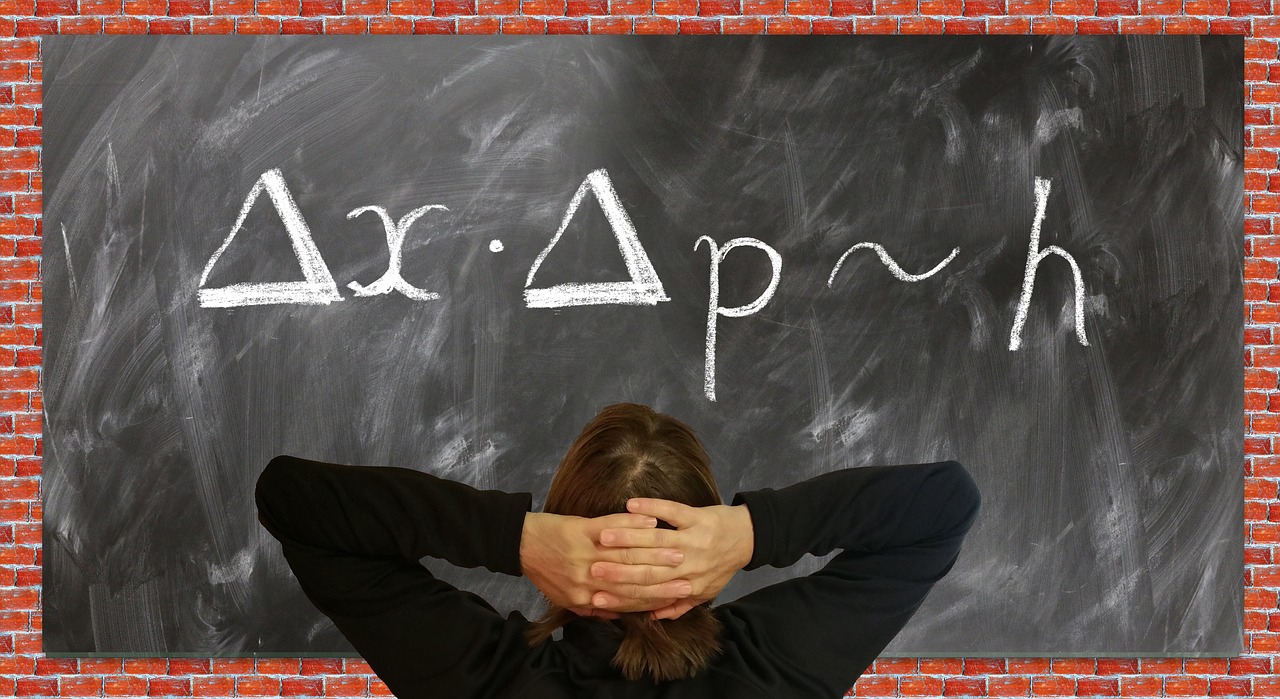
Quantum entanglement is one of the most fascinating phenomena in quantum mechanics, where particles become intertwined in such a way that the state of one immediately influences the state of another, no matter how far apart they are. This concept challenges our traditional notions of separateness and individuality, suggesting that at a fundamental level, everything in the universe is interconnected. Imagine two dancers performing a perfectly synchronized routine, even though they are on opposite sides of the stage—this is akin to how entangled particles operate, defying classical intuitions about distance and communication.
To truly grasp the implications of quantum entanglement, we must consider what it means for our understanding of reality. When two particles are entangled, measuring one particle instantly affects the other, regardless of the space that separates them. This phenomenon raises profound questions about the nature of information transfer and the fabric of reality itself. Are we witnessing a fundamental connection that transcends time and space? Or is this merely a quirk of quantum mechanics that we have yet to fully comprehend? The implications are staggering, hinting at a universe that is far more interconnected than we previously believed.
Moreover, quantum entanglement invites us to rethink the very essence of consciousness. If particles can maintain a connection across vast distances, could it be possible that consciousness itself is similarly interconnected? This notion opens the door to exploring collective human experience and awareness, suggesting that our thoughts and emotions might resonate with one another in ways we have yet to understand. The idea that we are not isolated beings, but rather part of a larger tapestry of existence, can be both enlightening and humbling.
To illustrate the concept of quantum entanglement and its implications for interconnectedness, consider the following table:
| Aspect | Classical View | Quantum View |
|---|---|---|
| Separation | Particles exist independently | Particles can be interconnected |
| Influence | Local interactions only | Instantaneous influence across distances |
| Nature of Reality | Objective and deterministic | Subjective and probabilistic |
As we delve deeper into the implications of quantum entanglement, we might find ourselves questioning the very nature of our individual identities. If we are all interconnected at a quantum level, what does that mean for our perception of self? Are we merely reflections of a greater whole, or do we maintain our individuality while still being part of this intricate web of existence? These questions challenge us to expand our understanding of consciousness and reality, urging us to explore the profound interconnectedness that quantum mechanics suggests.
In conclusion, quantum entanglement not only reshapes our understanding of physical reality but also challenges us to reconsider our perceptions of consciousness and interconnectedness. As we continue to explore these mysteries, we may uncover insights that bridge the gap between science and philosophy, offering a more holistic view of existence itself.
- What is quantum entanglement? Quantum entanglement is a phenomenon where two or more particles become linked, such that the state of one particle instantly influences the state of the other, regardless of the distance between them.
- How does quantum entanglement challenge our understanding of reality? It suggests that at a fundamental level, particles are interconnected, which contradicts classical physics' view of separate, independent entities.
- What implications does quantum entanglement have for consciousness? It raises the possibility that consciousness may also be interconnected, influencing collective human experience and awareness beyond individual perception.

The concept of nonlocality in quantum mechanics is nothing short of mind-bending. Imagine a scenario where two particles, once entangled, can instantaneously affect each other's state, regardless of the distance separating them. It’s like having a pair of magic dice: no matter how far apart you roll them, if one shows a six, the other will too, instantly! This phenomenon challenges our classical intuition about how objects interact, suggesting that the universe operates on a level that transcends the conventional boundaries of space and time.
At its core, nonlocality implies that particles can remain connected in ways that defy the laws of classical physics. This interconnectedness raises profound questions about the nature of reality. How can information seemingly travel faster than light? What does this mean for our understanding of causality? To put it simply, nonlocality suggests that the universe may be more of a web of relationships than a collection of isolated events. The implications of this idea ripple through both physics and philosophy, inviting us to reconsider our assumptions about separateness and individuality.
One of the most famous thought experiments illustrating nonlocality is the Einstein-Podolsky-Rosen (EPR) paradox. In this scenario, two particles are entangled and then separated by vast distances. When a measurement is made on one particle, the other particle’s state is determined instantaneously, regardless of the distance. Einstein famously referred to this as "spooky action at a distance," expressing his discomfort with the idea that information could be exchanged so rapidly without any known mechanism. This paradox not only challenges our understanding of physics but also invites deeper philosophical inquiries into the fabric of reality itself.
To further illustrate the concept of nonlocality, consider the following table that outlines key characteristics of this phenomenon:
| Characteristic | Description |
|---|---|
| Instantaneous Connection | Entangled particles can affect each other's state regardless of distance. |
| Defiance of Classical Physics | Nonlocality challenges the traditional laws of physics that govern local interactions. |
| Philosophical Implications | Raises questions about the nature of reality, causality, and the interconnectedness of all things. |
As we delve deeper into the implications of nonlocality, it becomes clear that this phenomenon may hold the key to understanding not just the quantum realm, but also the very essence of consciousness. If particles can be interconnected beyond the constraints of space and time, could it be possible that human consciousness operates in a similar manner? This idea opens up fascinating avenues for exploration, suggesting that our thoughts and experiences might be more interconnected than we ever imagined.
In summary, the nonlocality phenomenon is a captivating aspect of quantum mechanics that challenges our conventional understanding of reality. It invites us to expand our perceptions and consider the profound interconnectedness that may exist within the universe. As we continue to explore these concepts, we may uncover insights that not only reshape our scientific understanding but also transform our philosophical perspectives on existence itself.
- What is nonlocality? Nonlocality refers to the phenomenon where entangled particles can instantaneously affect each other's state, regardless of the distance between them.
- How does nonlocality challenge classical physics? It defies traditional notions of causality and locality, suggesting that particles can be interconnected in ways that classical physics cannot explain.
- What are the implications of nonlocality for consciousness? Some theories propose that nonlocality may extend to consciousness, indicating a deeper interconnectedness among all beings.

When we dive into the world of quantum mechanics, we can't help but notice how it intertwines with the concept of consciousness. Imagine for a moment that our consciousness is not just a byproduct of our brains, but rather a fundamental aspect of the universe itself. This idea isn't just a whimsical thought; it has profound implications for how we understand our existence and our place in the cosmos.
At the heart of this discussion is the notion of interconnectedness. Quantum entanglement suggests that particles can be linked in such a way that the state of one particle instantly influences another, regardless of the distance separating them. This phenomenon challenges our traditional views of separateness, prompting us to consider whether our consciousness could also be interconnected in ways we have yet to fully comprehend. Could it be that our thoughts and experiences are not isolated but part of a larger, collective consciousness?
Moreover, the implications of quantum mechanics extend to the very act of observation. The famous observer effect highlights that the act of measuring a quantum system alters its state. This raises a tantalizing question: does our consciousness play a role in shaping reality? If our awareness can influence the outcome of quantum events, what does that mean for our understanding of free will and determinism? Are we mere spectators in a predetermined universe, or do we actively participate in creating our reality?
To further explore these ideas, let’s consider some key points:
- Collective Consciousness: The concept that individual minds are part of a larger, interconnected whole, potentially influenced by quantum entanglement.
- Reality Formation: The idea that our consciousness might play an active role in determining the state of reality, challenging the notion of an objective universe.
- Free Will vs. Determinism: Quantum mechanics raises questions about whether our choices are truly free or if they are influenced by underlying quantum processes.
As we ponder these implications, we realize that the intersection of quantum mechanics and consciousness opens up a treasure trove of philosophical inquiries. It invites us to reconsider the nature of reality, urging us to ask deeper questions about who we are and how we relate to the universe. Perhaps consciousness is not just a product of biological processes, but a fundamental feature of the cosmos that allows us to experience and shape our reality.
In conclusion, the implications of quantum mechanics for consciousness are both fascinating and perplexing. They challenge us to rethink our assumptions about individuality, reality, and the very fabric of existence. As we continue to explore these ideas, we may find that the answers lie not only in the realm of physics but also in the depths of our own consciousness.
1. How does quantum mechanics relate to consciousness?
Quantum mechanics suggests that consciousness may play a role in shaping reality through the observer effect, where the act of observation influences quantum systems.
2. What is the observer effect?
The observer effect refers to the phenomenon where the act of measuring a quantum system alters its state, raising questions about the nature of reality and perception.
3. Can consciousness be interconnected?
Quantum entanglement implies a level of interconnectedness that challenges our understanding of separateness, suggesting that consciousness might also be interconnected in ways we have yet to fully understand.
4. Does quantum mechanics support the idea of free will?
Quantum mechanics raises intriguing questions about free will and determinism, suggesting that our choices may be influenced by quantum processes, but the extent of this influence is still a topic of debate.
Frequently Asked Questions
- What is the metaphysical interpretation of quantum mechanics?
The metaphysical interpretation of quantum mechanics delves into the philosophical implications that arise from the principles of quantum theory. It challenges our conventional understanding of reality, consciousness, and existence, suggesting that the universe may be interconnected in ways that classical physics cannot explain.
- How does quantum mechanics challenge traditional notions of reality?
Quantum mechanics introduces concepts like wave-particle duality and the observer effect, which imply that reality is not as fixed as we once believed. Instead, it suggests that the act of observation plays a crucial role in determining the state of a quantum system, making reality more subjective than objective.
- What is the observer effect in quantum mechanics?
The observer effect refers to the phenomenon where the act of measuring or observing a quantum system alters its state. This raises profound questions about the nature of reality: if observation can change outcomes, what does that say about the universe when unobserved?
- Does consciousness play a role in quantum mechanics?
Some theories propose that consciousness might be fundamental in the measurement process of quantum mechanics. This suggests that our awareness and perception could influence the very fabric of reality, intertwining consciousness with the physical universe.
- What are the different interpretations of quantum mechanics?
There are several interpretations of quantum mechanics, including the Copenhagen interpretation, Many-Worlds Interpretation, and pilot-wave theory. Each offers unique insights into the nature of reality and consciousness, reflecting the ongoing debate about what quantum mechanics truly means.
- What is quantum entanglement?
Quantum entanglement is a phenomenon where pairs or groups of particles become interconnected in such a way that the state of one particle instantly influences the state of another, regardless of the distance separating them. This challenges our traditional understanding of separateness and individuality in the universe.
- How does quantum entanglement relate to consciousness?
Some researchers speculate that quantum entanglement may have implications for consciousness, suggesting that the interconnectedness observed at the quantum level could extend to collective human experiences and awareness, potentially influencing how we perceive reality.





